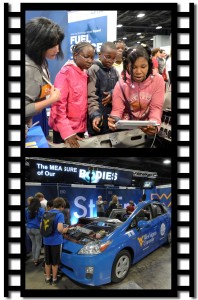 By Judy Moore
By Judy Moore
Today there are many alternatives for powering the vehicle you choose to drive, and if you choose wisely, you can even contribute to our nation’s quest for energy independence and cleaner air. Fortunately, the successful advancements of research and technology have made a tremendous impact on lessening our dependence on foreign oil and reducing vehicle emissions in the air through the development of alternative fuel and advanced technology vehicles—and a West Virginia-based program is helping lead the way by providing education on these vehicles.
The National Alternative Fuels Training Consortium (NAFTC), a program of West Virginia University, has been promoting and providing education on alternative fuel and advanced technology vehicles since 1992. Presently offering more than 25 courses and workshops, the fuel-neutral organization plays a key role in providing education to numerous audiences on these new technology vehicles. Since these vehicles are different than conventional vehicles, they require a new level of expertise and knowledge from multiple audiences such as automotive technicians, first responders and consumers.
Depending on their location in the U.S., today consumers can choose to power their vehicles by one of many alternative fuel sources, such as biodiesel, ethanol, propane, natural gas, hydrogen or electricity. Among these numerous types of fuel sources are two that are significantly impacting West Virginia: electric drive vehicles, (including plug-in and battery electric vehicles), that consume electricity from West Virginia coal-fired power plants and natural gas powered vehicles that use the abundant natural gas in West Virginia. Both of these directly affect the economy of the Mountain state.
To date, the NAFTC has trained more than 33,000 technicians on alternative fuel vehicles (AFV’s) and advanced technology vehicles in more than 1,750 courses. The NAFTC has conducted more than 1,675 workshops and education/awareness events with more than 850,000 attendees, including government officials, fleet managers, teachers and students, vehicle decision makers from large corporations, families and individuals. Reaching a mixed audience, the NAFTC takes a blended learning approach with its instruction. In addition to standard classroom learning, the NAFTC offers numerous hands-on activities, online classes and smartphone apps.
One unique educational tool often available at NAFTC trainings is Hybrid Electric Vehicle Training Educator (HEVTE), a heavily-modified, third-generation Toyota Prius. The fully functional cutaway vehicular training tool allows automotive students, technicians and first responders to easily and safely interact with advanced hybrid vehicle components through classroom training and scan tools. By scanning electronic QR codes, training participants learn the intricacies of the vehicle parts that make a hybrid unique. Even when HEVTE is not available at events, interactivity and discussions utilizing the vehicle component descriptions are a part of the class and are accessible online at www.aedve.info/cutaway.
The NAFTC is also the developer of the National Alternative Fuel Vehicle (AFV) Day Odyssey, the nation’s largest nonprofit consumer educational program. National AFV Day Odyssey was designed to create public awareness and promote the use of alternative fuel and advanced technology vehicles. Odyssey was conducted in 2002, 2004, 2006, 2008, 2010 and 2012 with incredible success throughout the years. The 2012 Odyssey event attracted more than 250,000 direct attendees and reached more than 200 million people through media coverage and the Internet.
The consortium in NAFTC refers to the organization headquartered at West Virginia University, which consists of nearly 50 educational institutions, including high schools, community colleges, technical colleges, four-year colleges and universities. The NAFTC develops the curriculum on alternative fuel and advanced technology vehicles and conducts train-the-trainer courses for the instructors from these institutions. Each of these institutions joins the NAFTC to be able to provide quality training for the automotive students in their schools and believe in reducing America’s dependence on foreign petroleum and reducing vehicle emissions.
In addition, the NAFTC disseminates timely information on exciting industry developments year-round via its Web site and monthly eNews. Each month, readers can learn about what is going on at the NAFTC and get up-to-date information on worldwide AFV and advanced technology vehicle news.
With current elevated gasoline prices and concern about protecting natural resources, keeping our air clean and dependence on foreign oil, the NAFTC serves a pivotal role through education and outreach in leading a nationwide movement towards AFV and advanced technology vehicle development and use. The consortium takes pride in creating this awareness and demonstrating that these vehicles are part of the solution to our country’s environmental and energy needs.
The NAFTC offers training courses and workshops covering nearly every facet of emerging vehicle technologies and alternative fuels. To learn more, visit www.naftc.wvu.edu or call the NAFTC at 304-293-7882.
 About the Author
About the Author
Judy Moore is the assistant director for Communications and Outreach for the West Virginia University/National Alternative Fuels Training Consortium (NAFTC). Serving in this position since 2005, her main responsibilities at the NAFTC include providing leadership in areas of creative direction, media relations and management for the communications, marketing and education and outreach efforts. This includes the coordination of National AFV Day Odyssey, the nation’s largest awareness and education event on alternative fuel and advanced technology vehicles. Moore has more than 30 years of experience in the marketing and communications fields. She has a Bachelor of Fine Arts in digital design/visual communications and a master’s degree in integrated marketing communications.








